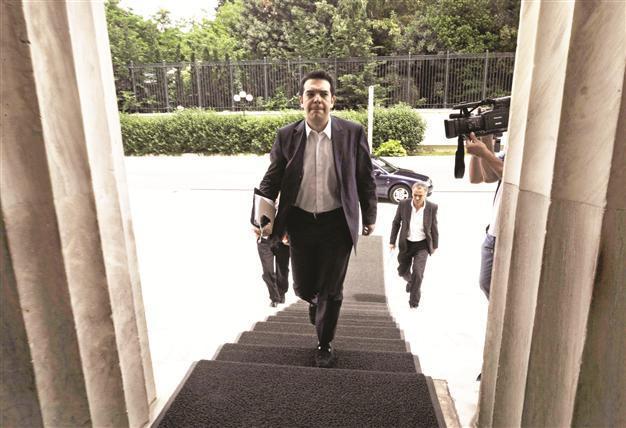Greece coalition bargain hinge on radical left party
ATHENS

The Greek leader of the Radical Left (Syriza) coalition, Alexis Tsipras, arrives at parliament in Athens on May 8. AFP photo
Greece remained mired in a political stalemate on May 11, as negotiations on forming a coalition government stalled after inconclusive weekend polls boosted anti-austerity parties and rattled the eurozone.Hopes for a breakthrough earlier in the day were dashed when a possible ally, the small Democratic Left, said it would not join a government without fellow leftists Syriza, a party that opposes the terms of the 240 billion euro EU-IMF bailout.
“We will not participate in a government with [only] New Democracy and PASOK,” Democratic Left leader Fotis Kouvelis told party representatives, Agence France-Presse reported.. “Unless Syriza changes stance we will have to repeat the elections.”
Conservative New Democracy leader Antonis Samaras also said a government cannot be formed without the Syriza party. “There must be a durable government,” Samaras told a meeting of his party.
“The Syriza party must participate, or give a vote of tolerance. It’s in their hands to decide what they want to do.”
Socialist leader Evangelos Venizelos, who participated in the last government in a coalition with Samaras’ party, has been tasked with forming a coalition by late May 11, after earlier efforts by Samaras and Syriza leader Alexis Tsipras failed. He was scheduled to meet with leader of Syriza leader at 4:00 p.m. GMT, but reports said he would give up the mandate on May 11. This would leave room for a last-ditch meeting between President Carolos Papoulias and the leaders of all the parties, which is likely to take place late May 11 or 12, in hopes of forming an emergency unity government.
A poll published Friday showed Syriza could even emerge as the victor, if new elections are held in June. The poll by Alpha television gave Syriza 27.7 percent of the vote, far above its total of just under 17 percent in last Sunday’s elections.
Banks ready for drachma
LONDON / BERLIN
Banks are quietly readying themselves to start trading a new Greek currency. Some banks never erased the drachma from their systems after Grece adopted the euro more than a decade ago and would be ready at the flick of a switch if its debt problems forced it to bring back national banknotes and coins. Planning behind the scenes has been underway since Europe’s debt crisis erupted in Greece in 2009, said U.S.-based Hartmut Grossman of ICS Risk Advisors who works with Wall Street banks. Meanwhile Germany’s finance minister said in an interview on May 11 that the eurozone would cope if Greece left the currency union. “We want Greece to remain in the eurozone. But it also has to want this and to fulfill its obligations. We can’t force anyone” Wolfgang Schaeuble told the regional Rheinische Post.
















